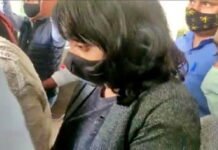
A 22-year-old climate change activist, Disha Ravi, who was arrested at the hands of the Delhi Police in a toolkit case related to the Farmers’ Protests, was released on bail by the Delhi Sessions Court. Ten important reasons to give direction to Bell will tell you, before that remind Delhi Police by calling the toolkit a document giving information about how to conduct the movement systematically and take necessary steps during the movement. Also, activists like Nikita Jacob (Nikita Jaicob) and Shantanu Muluk were also under investigation.
The court, which justified the disagreement with the government, granted direction to Direction Ravi on a surety bond. On the direction, the police had accused sections 124A (sedition) and 153A i.e. of spreading hatred among various groups on the basis of religion, race, place of birth, residence or language etc. While giving direction to Judge Dharmendra Rana, he gave some important things as reasons. Know these ten important points.

Who is Disha Ravi, what is toolkit, what is toolkit case, Disha Ravi is a bail activist climate activist and founder of Friday for Future India.
- Understand in simple terms, the court said that a minor engagement of a person with a suspicious identity should not be considered a serious offense. In Asl, the police accused Disha of attending a zoom meeting with some members of the alleged offensive group ‘Poetic Justice Foundation’. In a group meeting of about 70 people, two pro-Khalistan suspects were also involved.
- Disha was accused of violence in Delhi on 26 January due to his activities related to the toolkit. But the court clearly said that there was no concrete evidence to prove this allegation. The court observed that hundreds of people were arrested in this violent case but the police could not prove the direction of relation with them.
- The court clearly said that opposing the agricultural laws, sharing an idea on a platform cannot be construed as a person being a separatist, when there is no other evidence.
- The important aspect of the court’s order was that the court introduced the toolkit document and after observing it said that such a document does not prove the theory of conspiracy of violence.
- The court said that in a democracy, citizens are the watchmen of consciousness for the government. A citizen cannot be put behind bars simply because he does not agree with the government’s policies. The court emphasized that ‘conscious citizens are essential for healthy democracy’.
- Aa no bhada: katwo yantu vishwatoddbadhaso aparitas idadah… meaning let the best thoughts come from every direction. Quoting this verse of Rigveda, the court said that there is respect for different views in Indian civilization. Our culture has been giving everyone the right to have their own opinion.
- The court said that our ancestors gave us the fundamental right to freedom of expression. In the words of the court, ‘Article 19 of the Constitution of India has a strong right to disagreement.’ Talking on this aspect, the court also made it clear that no person within the scope of this right can reach expression in the world to whom he wants, without breaking the scope of the law.
- On the direction, the police alleged that formed a WhatsApp group related to the farmer strike, deleted the chat, in which Disha also added Shantun as well as foreigners like Greta Thunberg so that violence in Delhi could be planned in a planned manner. On this, the court said that it is not a crime to create a WhatsApp group or edit / share any harmless document. On Shantanu’s talk, the protest was given by the Delhi Police, so how did the law be broken by someone’s involvement in it.
- The police alleged that Disha, along with her colleagues, not only intended to sabotage the Indian embassies under the guise of protests but also insulted Indian symbols like yoga and tea. In this regard, the court said that the evidence related to this charge was not produced before the court. According to the court, the theory of sabotage in the embassy was not proved by the facts or evidence presented.
- The Court admitted that no offense can be proved on the basis of such little and incomplete evidence. Direction has already been interrogated for five days keeping the police in custody, so it is neither logical nor legal to keep it in check.















































